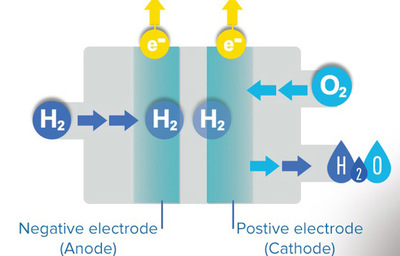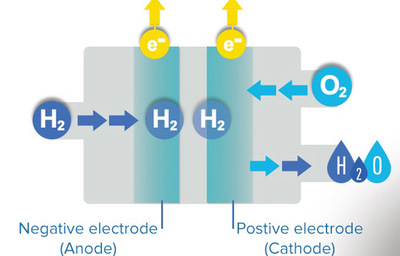Global Market for Hydrogen Fuel Cell Vehicles: Forecasts for Major World Regions To 2032
DUBLIN, May 21, 2020 -- The "Global Market for Hydrogen Fuel Cell Vehicles" report has been added to ResearchAndMarkets.com's offering.
This is one of the most comprehensive and timely reports on the hydrogen fuel cell vehicles market. The report provides detailed data on the sales of the hydrogen fuel cell vehicles from their initial commercial launch through 2019. It provides market forecasts for the major world regions through 2032. The report discusses automaker strategies and provides in-depth profiles of the automakers producing hydrogen fuel cell vehicles or those who could potentially enter this market.
Since 2014, the world has been witnessing a slow but steady transition to hydrogen fuel cell vehicles for the mass market. In 2014, when the first sales/leases of fuel cell vehicles took place, the U.S. led the field. The Asia-Pacific region took the lead in sales/leases in 2015 and 2016, but the U.S. became the top seller in 2017 and 2018. In 2019, Nexo had a phenomenal uptake of these vehicles in South Korea, propelling Asia-Pacific to the top spot.
Hydrogen fuel cell vehicles have entered the commercialization phase in sixteen countries in Europe and Middle East as well as in two Asia-Pacific countries (South Korea and Japan) and two countries in North America (U.S. and Canada). These vehicles are now being introduced in China and Latin America. China, in particular, will emerge as a major market for hydrogen fuel cell vehicles in the next few years.
More than 18 thousand hydrogen fuel cell vehicles were sold/leased globally by year-end 2019. In 2020, the rollout of these vehicles has begun accelerating. With zero-emission capability, these vehicles represent the future of the automobile. Information Trends projects that cumulatively, 6.56 million hydrogen fuel cell vehicles will be sold/leased globally between 2014 and 2032.
Three major automakers, Toyota, Honda and Hyundai, are already selling these vehicles to the general public. The market will become more competitive as Mercedes-Benz begins selling its fuel cell vehicle in the public domain. The vehicle is currently being provided as a rental in Germany, and it is being sold to select clients.
Volkswagen and BMW are getting ready to join the hydrogen fuel cell vehicle bandwagon, with launches in 2021 and 2022, respectively. In addition, the rollout of these vehicles from Chinese automakers, SAIC and Grove, is imminent.
The sales/leases have been slow in the beginning primarily due to the prohibitive costs of fuel cell vehicles and the absence of robust hydrogen fueling infrastructures. However, the costs of these vehicles are gradually coming down, and hydrogen fueling infrastructures are beginning to take shape. This is propelling a faster growth of these vehicles.
Current customers of these vehicles include vehicle fleets, government agencies and early adopters. Until a critical mass of customers is reached in the 2020s, the market will remain confined to early adopters and affluent segments of society.
By 2025, sufficient hydrogen fueling infrastructures will be in place in several regions of the world, giving an initial boost to the market for these vehicles. As fueling infrastructures further expand in the second half of 2020s, hydrogen fuel cell vehicles will begin to garner greater market acceptance, resulting in even faster market penetration.
Key Topics Covered:
1 Summary and Scope
2 Hydrogen FCVs
2.1 Hydrogen FCVs vs. BEVs
2.2 Classification of Hydrogen FCVs
2.3 Pros and Cons of Hydrogen FCVs
3 Factors Impacting Growth of FCVs
3.1 Regulatory Requirements
3.2 Availability of Hydrogen
3.3 Single Fueling Standard
3.4 Government Support
3.5 Hydrogen Station Costs and Availability
4 FCV Launches
4.1 Market Push
4.2 Vehicle Rollouts
4.3 Upcoming Launches
4.4 Delayed or Uncertain Launches
4.5 Automakers with Hydrogen FCV Expertise
4.6 Vehicles with Range Extenders
5 Sales/Leases
5.1 Global Sales/Leases
5.2 APAC Sales/Leases
5.3 EMEA Sales/Leases
5.4 Americas Sales/Leases
6 APAC FCV Launches
7 EMEA FCV Launches
8 Americas FCV Launches
8.1 U.S. Federal-Level Activity
8.2 U.S. State-Level Activity
9 Industry Collaboration
9.1 Overview
9.2 Global and Inter-Regional Initiatives
9.3 U.S. National Initiatives
9.4 Western U.S. Initiatives
9.5 Eastern U.S. Initiatives
9.6 Canadian Initiatives
9.7 EMEA Initiatives
9.8 APAC Initiatives
9.9 Automaker Partnerships
10 Automaker Profiles
11 FCVs Sales/Revenue Forecast
11.1 Unit Sales/Leases Forecast
11.2 Revenue Forecast
12 Conclusions
12.1 Market Launches
12.2 Hydrogen FCVs and BEVs
12.3 Role of Governments
12.4 FCVs Ecosystem
12.5 Next Steps
Companies Mentioned
- BMW
- Daimler
- Fiat Chrysler Automobiles N.V.
- Ford
- General Motors
- Grove Hydrogen Automotive
- Honda
- Hyundai
- Kia
- Mahindra & Mahindra
- Mazda
- Mitsubishi Motors
- Nissan
- Pininfarina S.p.A.
- PSA Group
- Renault
- Riversimple Movement Ltd.
- Ronn Motor Group
- SAIC Motor
- Suzuki Motors
- Symbio
- Tata Motors
- Toyota
- Volkswagen
For more information about this report visit https://www.researchandmarkets.com/r/7qlql2
About ResearchAndMarkets.com
ResearchAndMarkets.com is the world's leading source for international market research reports and market data. We provide you with the latest data on international and regional markets, key industries, the top companies, new products and the latest trends.




